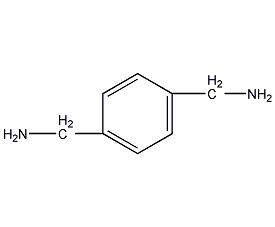p-xylylenediamine


Structural formula
| Business number | 05JR |
|---|---|
| Molecular formula | C8H12N2 |
| Molecular weight | 136.19 |
| label |
α,α′-Diamino-p-xylene, Aromatic nitrogen-containing compounds and their derivatives |
Numbering system
CAS number:539-48-0
MDL number:MFCD00009821
EINECS number:208-719-3
RTECS number:PF9000000
BRN number:2206190
PubChem ID:None
Physical property data
1. Physical properties: colorless monoclinic crystal.
2. Melting point (ºC): 102~103
3. Boiling point (ºC, 5.2kPa): 256~258
4. Solubility: easily soluble In ethanol, ether and chloroform.
Toxicological data
1. Skin/eye irritation data: Standard Draize test rabbit direct contact with skin: 750ug/24HREACTION SEVERITY: serious;
Standard Draize test rabbit direct contact with eyes: 50ug/24HREACTION SEVERITY: serious;
p>
Acute toxicity:
Severe irritation to skin 750ug/24H(rbt)
Severe irritation to eyes 50ug/24H(rbt)
Main irritation Sexual Effects:
On Skin: Causes corrosive effects on skin and mucous membranes.
On eyes: Strong corrosive effects
Sensitization: No known sensitizing effects.
Ecological data
General remarks
Water hazard level 1 (German regulations) (self-assessment via list) This substance is slightly hazardous to water.
Do not allow undiluted or large amounts of product to come into contact with groundwater, waterways or sewage systems.
Do not discharge materials into the surrounding environment without government permission.
Molecular structure data
1. Molar refractive index: 43.15
2. Molar volume (cm3/mol): 129.4
3. Isotonic specific volume (90.2K ): 338.9
4. Surface tension (dyne/cm): 47.0
5. Polarizability (10-24cm3): 17.10
Compute chemical data
1. Reference value for hydrophobic parameter calculation (XlogP): -0.4
2. Number of hydrogen bond donors: 2
3. Number of hydrogen bond acceptors: 2
p>
4. Number of rotatable chemical bonds: 2
5. Number of tautomers: none
6. Topological molecule polar surface area 52
7. Number of heavy atoms: 10
8. Surface charge: 0
9. Complexity: 73.3
10. Number of isotope atoms: 0
11. Determine the number of atomic stereocenters: 0
12. Uncertain number of atomic stereocenters: 0
13. Determine the number of chemical bond stereocenters: 0
14. Number of uncertain chemical bond stereocenters: 0
15. Number of covalent bond units: 1
Properties and stability
Poisonous. Strongly irritates skin and mucous membranes and can cause sensitization. Production equipment�� Sealed. Operators should wear protective equipment. Avoid direct contact with human body. If splashed on skin, rinse with plenty of water.
Storage method
Packed in plastic barrels, 25kg or 50kg per barrel. Store in a cool, ventilated place. Store and transport according to regulations for flammable and toxic substances.
Synthesis method
Using a mixture of m- and p-xylene as raw material, it undergoes ammoxidation reaction with air and ammonia to generate m- and terephthalonitrile. After washing and drying, catalytic hydrogenation is carried out in ethanol and potassium hydroxide solvents at 4.5MPa pressure and 90°C. The catalyst is removed from the reaction liquid, ethanol is recovered, and distilled under reduced pressure to obtain meta- and para-xylylenediamine. 
Purpose
Used in the manufacture of epoxy resin curing agents, photosensitive plastics, rubber additives, polyurethane resins and coatings, etc.
